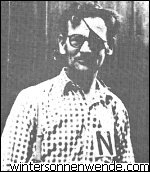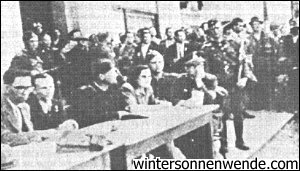 |

Ingomar Pust The Czech Victims of
Resistance
 ccording to a statement made by the Prague Ambassador to the
United States, J. Steinhart, to army officers and diplomats in Washington on December 15,
1947, the Czech victims of resistance numbered 37,000 persons
(including army-in-exile in Italy, Monte Cassino, student revolt in Prague, incidents of
sabotage, Lidice, and 6,456 victims of Allied bombing attacks). ccording to a statement made by the Prague Ambassador to the
United States, J. Steinhart, to army officers and diplomats in Washington on December 15,
1947, the Czech victims of resistance numbered 37,000 persons
(including army-in-exile in Italy, Monte Cassino, student revolt in Prague, incidents of
sabotage, Lidice, and 6,456 victims of Allied bombing attacks).In a February 6, 1990 Club II discussion on Austrian radio about the expulsion of the Sudeten Germans, the Czech participant, historian Vancura, and his fellow-countryman Klen, blithely inflated these 37,000 Czech victims to 370,000. Not one of the other participants in this debate refuted this deliberate misleading. Was it a matter of ignorance, or of cowardice? This massaging of numbers was exposed in an article in the Sudetenpost, issue 5 of March 8, 1990, signed A.J. The author of that article continued:
"This game of numbers cloaks the wish to clear the Czechs of their misdeeds. While the
daily papers barely mention the German losses to war and expulsion, or minimize them
deliberately for propagandistic considerations, the losses of the opposing side are
emphasized and even padded with an extra zero if needed.
 etter of the British Minister and MP, R. R. Stokes to the Manchester
Guardian, October 1945, as excerpted from Verheimlichte Dokumente, op.cit., p.
374: etter of the British Minister and MP, R. R. Stokes to the Manchester
Guardian, October 1945, as excerpted from Verheimlichte Dokumente, op.cit., p.
374:"Months ago I learned of the Czech practice of rounding up young men who, under the Decrees of Potsdam, were to be expelled for reasons of their ethnicity, and shipping them off to labor concentration camps. In fact, many Sudeten German Social Democrats who had been sent to concentration camps for their anti-National Socialist views were now committed to Czech labor camps, solely because they were German." The 1945 memorandum of Sudeten German Social Democrat Wilhelm Niessner to the government at Prague makes similar observations (as per Brügel, Tschechen und Deutsche, v. 2, Munich, 1974). The same goes for the shocking letter of Wenzel Jaksch, the Sudeten German Social Democrat in exile, to Dr. Edward Benes, the Czech President-in-exile residing in London. The Stokes Report continues: "There are 51 such camps in Czechoslovakia, in which thousands of people suffer and starve; and when I say starve, I mean that literally!" In Account No. 300, p. 431 of the book Documents on the Expulsion of the Sudeten Germans (Munich: Arbeitsgemeinschaft zur Wahrung Sudetendeutscher Interessen, 1951, English translation 2002 by The Scriptorium), Director Pischel of Rokitnitz writes: "The men who escaped death were sent by the Czechs to hastily established concentration camps, 51 of them, where they had to do hard labor, for example underground mining, with lousy rations and constant maltreatment." A concentration camp inmate tells of the terrorism engaged in by the victorious Allies. (From Die Vertreibung Sudetenlands 1945/46, Bad Nauheim, 1967, p. 299.) Josef Eckert was one of those men whom the National Socialists had thrown into concentration camp Dachau and for whom liberation came on May 8, 1945. He came from Brüx, and after being released from the concentration camp he hurried home to his native city, which he had not seen for many years. Later he wrote one of his fellow-sufferers from Dachau: "The Czechs came to our city as avengers driven by hatred. First all German signs had to be taken down. Then we had to turn in all bicycles, motorcycles, radio sets, typewriters and telephones, and harsh penalties were in store for anyone who did not obey this order. Then the Czechs proceeded to plunder our houses. They went systematically from house to house, from home to home and stole furniture and linen, clothing and jewelry, in a word, anything they liked. But the plundering was not the end of it. There were also murders. On one of these horrible days they arrested comrade Willi Seifert, from Bandau. He was accused of having hidden a roll of telephone wire. At the Czech command post in the inn 'Gebirgshöhe' they stood him up against a wall and murdered him from behind."
 n 1945 the Sudeten German Social Democrat Wilhelm Niesser sent
the following memorandum to the Prague government (quoted from Brügel,
op.cit.): n 1945 the Sudeten German Social Democrat Wilhelm Niesser sent
the following memorandum to the Prague government (quoted from Brügel,
op.cit.):
 rom pages 59-60 of the 3rd ed. of Wie es wirklich war, the
memoirs of Anna Spangl, born in Prittlach, South Moravia. rom pages 59-60 of the 3rd ed. of Wie es wirklich war, the
memoirs of Anna Spangl, born in Prittlach, South Moravia."...We were standing on the steps, lamenting our dreadful fate; all of a sudden we heard loud singing and howls of excitement outside. I looked out the gate, oh horror, there were some 100 men from Rackwitz marching along, each of them with a bludgeon in his hand - the gendarme out front, and the others behind him in rows of four. They stopped outside the inn and spread out. In pairs of twos they ran into the houses, like madmen, and drove out the inhabitants of the entire town, first herding them together in front of the inn and then to Rackwitz into a barn. Here we had to spend the night in the dirt. All night long they took random shots at the people in the barn. Early in the morning we had to set off; again they drove us along with their clubs and bludgeons. The children screamed in fear. Let no-one think that it was the just the lowest rabble that drove us out in such a barbaric manner! The doctor, government officials, teachers, right down to the common laborers - all classes were involved. We had no idea what would happen to us. We were herded on without even being able to take any of our possessions. We dragged ourselves towards the town of Kostel. High school teacher Vessely walked beside me, club in hand. He was a good acquaintance of mine, and so I dared ask him: 'For God's sake, what are you doing with us?' He answered: 'Because I like you so much, I'll tell you. In Lundenburg you'll be put on a wagon train and shipped off to Siberia, but I'll give you some good advice, when the train moves out you jump off it quickly, because from there it's not far for you to get to Austria. Your parents are already old anyhow, it's not much loss if they are sent to Siberia.' So that was the advice an educated man gave me! The farmer Valenta from Rackwitz acted similarly. He was wearing a Czech uniform - years ago he had used to embrace the German soldiers in our basement! My father was happy to see a friend - finally, a decent Czech! - and wanted to greet him - but evidently there was no decent Czech there after all, because Valenta put out his hand and said to my father, 'Go on, just keep marching.' "I can't bear to recall what a terrible state of mind we were in, and how physically run-down. Without a home, stripped of all human dignity, lying in the ditch like mangy dogs, no refuge for us anywhere - cast out of our beloved ancestral home and shunned by society, hungry and cruelly expelled." In her memoirs Wie es wirklich war, Anna Spangl recalls the plundering, destruction, damage and rape and recounts on pp. 49-50 how old Frau Rebefka was shot because she had tried to protect the Ukrainian woman who had worked for her from being raped. "The women were hunted like rabbits, the best hiding places were found out, and women were raped with no regard to their age, whether they were ten or 90. My grandmother's sister was 86 years old and almost blind, she was raped twice. Because I put up a fight with hands and feet against being raped, those sadists dragged me like an animal to the slaughter - right past my father. He cried, 'for God's sake, why didn't I let her go away?' My mother was sobbing terribly, and my tormentors took me into the neighboring house. Four men raped me there. The first one was an officer, the last a horribly ugly Asian. There was sobbing and screaming everywhere. Often the parents were forced to watch the rape of their daughters, and vice versa, the children had to watch their mothers being violated. Many women contracted venereal diseases, and I wasn't spared that either. Some time later, all women had to go to Rackwitz for a medical exam. Those who didn't go kept it secret because they were ashamed."
|










